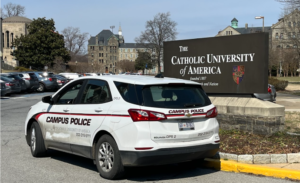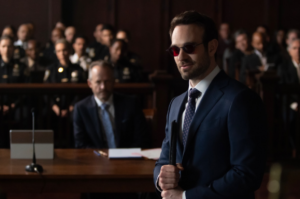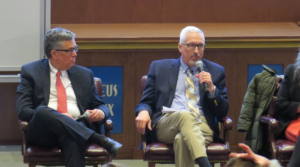A Controversial Night with Historic Wins: The 93rd Academy Awards

Image Courtesy of CBS News
By Noelia Veras
The 93rd Academy Awards occurred this Sunday, marking the end of the awards season for 2021. The event was notably different from the usual event as it took place in separate venues to account for Covid-19.
Regina King opened the night by strutting through Los Angeles’s Union Station and even took a moment to address the Derek Chauvin trial in Minneapolis and the fact that if things had gone differently she would have been protesting rather than presenting at the Oscars.
“As a mother of a Black son, I know the fear that so many live with and no amount of fame or fortune changes that,” King said.
The Academy has received backlash though for even being done in person. Although the presenters emphasized that everyone was rapid-tested and that there were different venues to be able to control the amount of people gathered, there is still controversy surrounding the event. A major point of contention is that the Academy told nominees that they could not Zoom in to the event and must give their speeches in person. However, some individuals like Florian Zeller, co-writer of The Father, accepted their awards synchronously via video chat. Evidently, this Zoom ban was not as strict as audiences initially assumed.
The first award of the night went to Emerald Fennell, director and writer of Promising Young Women for best original screenplay. Fennell started off a night of disorganized speeches with a funny and whimsical acceptance speech.
“I’m trying very hard not to cry because as an English person … I don’t cry ever,” Fennel said.
The night moved forward awarding The Father for best adapted screenplay and Another Round from Denmark for best international film.
Daniel Kaluya won best actor in a supporting role for his work in Judas and the Black Messiah. His family watched him from the satellite Oscars location in London, at the BFI Southbank venue.
Ma Rainey’s Black Bottom won for the best makeup and hair on screen. The makeup and hair team included Mia Neal, Jamika Wilson, and Sergio Lopez-Rivera. Neal and Wilson made history being the first Black women to win in the category.
“I also stand here as Jamika and I break this glass ceiling with so much excitement for the future,” Neal said. “Because I can picture Black trans women standing up here and Asian sisters, and our Latina sisters and indigenous women. And one day it won’t be unusual or groundbreaking. It would just be normal.”
Ann Roth won the award for best costume design for her work on Ma Rainey’s Black Bottom.
Bob Beitcher, president and CEO of the Motion Picture and Television Fund, was awarded one of the humanitarian awards of the night for his help in making productions possible and safe during the coronavirus pandemic. He thanked the frontline workers that helped him and made his work possible. Additionally, the presenter of the award, actor Bryan Cranston, thanked the 70 vaccinated frontline workers who were at the Dolby Theatre that night.
Last year’s winner of best director, Bong Joon-Ho, presented this year’s best director award from a satellite location. Chloe Zhao received the award for best director for her work on Nomadland. This is the first time that the award for best director has been given to a woman of color.
This category was historic because two women, Zhao and Fennell, were nominated for the first time ever.
“History was already made with best director and Chloe Zhao cemented it,” according to CNN. “It took 93 years for the Academy to name an Asian woman as best director. And until this year, only five women, all White, had ever been nominated and only one had won — Kathryn Bigelow, in 2010, for The Hurt Locker.”
The sound crew from Sound of Metal won the award for achievement in sound, which was coincidentally presented by the lead actor of the same film, Riz Ahmed, who was also nominated for best actor in a leading role. Sound of Metal’s sound crew includes Nicolas Becker, Jaime Baksht, Michelle Couttolenc, Carlos Cortes and Phillip Bladh.
Travon Free and Martin Desmond Roe accepted the award for best live action short film for their film Two Distant Strangers. The film follows a Black man who relives the day he has a deadly encounter with a police officer. Free wore a suit with the names of victims of police killings and gave a powerful speech upon accepting the award, quoting writer James Baldwin.
“[The] most despicable thing a person can be is indifferent to other people’s pain,” Free said. “I ask that you please not be indifferent. Please don’t be indifferent to our pain,” Free added.
Will McCormack and Michael Govier accepted the award for best animated short film for their film If Anything Happens, I Love You. The film follows two parents, whose daughter was killed in a school shooting. McCormack and Govier dedicated the award to those who have been victims of gun violence.
Soul won for best animated feature film and both Pete Docter and Dana Murray accepted the award. Docter dedicated the award to music teachers everywhere and said the film was also a love song to jazz.
Colette won for best documentary short film and My Octopus Teacher won the award for best documentary feature film.
Tenet was awarded for best visual effects, and Scott Fisher accepted the award, noting that his father won the same award years ago. According to CNN, his father, Thomas L. Fisher, was one of the winners at the 70th Academy Awards for his work on Titanic.
Minari’s Yuh-Jung Youn won for best actress in a supporting role. She was one of the stand out winners of the night, not only for giving a funny and heartfelt speech – sharing kind words about Minari director Lee Isaac Chung and greeting Brad Pitt – but also because she made history by becoming the first Korean actor to win an Academy Award.
Mank followed up by winning both awards for production design and cinematography.
Mikkel E.G. Nielsen accepted the award for film editing for his work on Sound of Metal.
Tyler Perry received the Jean Hersholt Humanitarian Award for all of the work he has done to help others during the coronavirus pandemic. He received a standing ovation for his incredible work and lasting impact on the people he has helped.
According to the Academy, “Perry was instrumental in quickly creating a safe way to return to production during the worldwide health crisis.”
Soul won for best original score, and Jon Batiste, Atticus Ross, Trent Reznor all accepted the award.
“This moment is a culmination of a series of miracles,” Batiste said when accepting the award.
Best original song went to H.E.R. for the song “Fight for You,” featured in Judas and the Black Messiah.
As usual, the Academy honored individuals that have died in the past year as a tribute to their work in the film industry. This segment was introduced by Angela Bassett who played alongside the late Chadwick Boseman in Black Panther who was honored at this time and notably nominated for best actor in a feature film for Ma Rainey’s Black Bottom.
Nomadland won best picture, and soon after, Frances McDormand accepted the award for best actress in a leading role for her work on this film.
The most controversial moment of the night, however, was when Anthony Hopkins won best actor in a leading role, over Boseman who everyone believed was the frontrunner. Social media has been aflame since the announcement of best actor, with many people expressing their disappointment in the Academy for bringing Boseman’s family to a potentially dangerous event, as the coronavirus pandemic is still a pertinent threat to people’s livelihoods, to not award the late Boseman for his work on Ma Rainey’s Black Bottom.
Chadwick Boseman’s brother Derrick, on the other hand, has implored people to stop calling Hopkins’ win a snub, since everyone nominated for best actor in a leading role did good work in the films that they were nominated for this year.
Additionally, this year’s awards were historically poorly watched, reaching 9.2 million viewers, the lowest number on record and a 51% drop from 2020, showcasing perhaps it was not worth the lengths the Academy went to to have this event in person.
The event went as smoothly as possible given the circumstances but still remains controversial for happening in the midst of the coronavirus pandemic. Although the event celebrated the talent of deserving artists, it begs the question of whether it was necessary or not to be conducted in person when most people are still just trying to get over the pandemic and avoid super-spreader events.
Overall, the 93rd Academy Awards were historical for many reasons, one of the most important of which was its inclusivity. With Zhao being the second woman to win best director and the first woman of color to win, and nine of twenty acting nominations being given to people of color, the night was starkly different from the awards in 2015. The Academy evidently still has work to do in recognizing talent equally and justly, but it seems this year is a step in the right direction.







